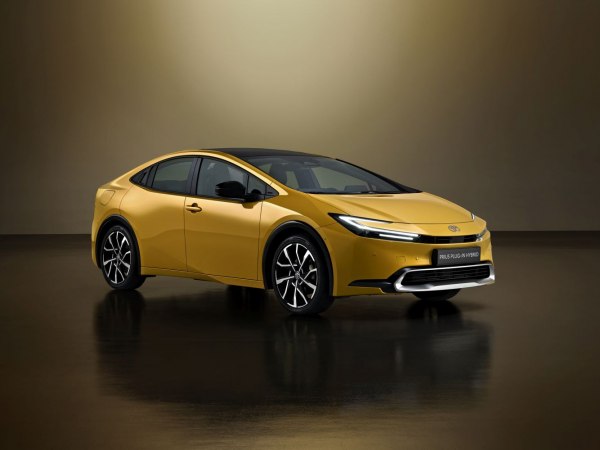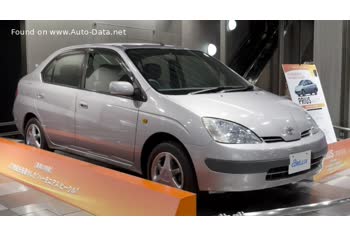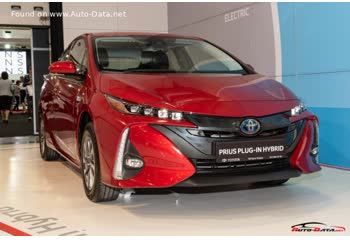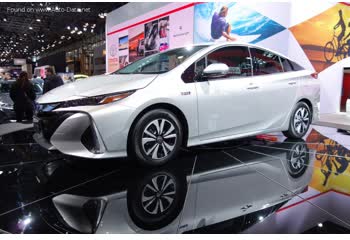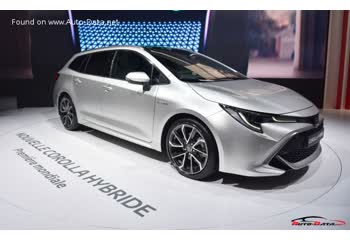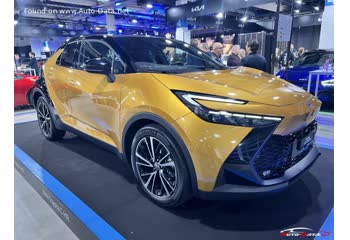Toyota Prius 2023 - 2.0 (223 Hp) Plug-in Hybrid e-CVT specifications
Overview
What is the engine capacity of a Toyota Prius 2023?
The engine capacity of the Toyota Prius 2023 is 1986 cm.
Toyota Prius 2023 How many horsepower?
The engine power of the Toyota Prius 2023 is 151 Hp @ 6000 rpm..
What is the Toyota Prius 2023 engine?
Toyota Prius 2023 engine is M20A-FXS. (Click to see other cars using the same engine)
How powerful is the electrical system in the Toyota Prius 2023?
The power of the electrical system in the Toyota Prius 2023 is 223 Hp hp.
How much gasoline does a Toyota Prius 2023 consume?
The Toyota Prius 2023 consumes 3.8 liters of gasoline per 100 km
What is the recommended oil for a Toyota Prius 2023 engine?
The recommended oil for a Toyota Prius 2023 car engine is 0W-20.
What type of camshaft transmission system is used in a Toyota Prius 2023 engine?
chain is used to transmit motion.
General:
Brand
Toyota
Model
Prius
Generation
Prius V (XW60)
Modification (Engine)
2.0 (223 Hp) Plug-in Hybrid e-CVT
Start of production
July, 2023
End of production
Powertrain Architecture
Body type
Seats
5
Doors
5
Engine:
Engine systems
Start & Stop System
Power
151 hp @ 6000 rpm.
Power per litre
76 hp/l
Torque
188 nm @ 4400-5200 rpm.
Engine Model/Code
Engine displacement
1986 cm
Number of cylinders
4
Engine configuration
Inline
Number of valves per cylinder
4
Fuel injection system
Direct injection and Multi-port manifold injection
Engine aspiration
Naturally aspirated engine
Valvetrain
VVT
Engine oil capacity
4.2 l
Coolant
6.1 l
Engine layout
Front, Transverse
Cylinder Bore
80.5 mm
Piston Stroke
97.6 mm
recommended engine oil
0W-20
euro standards
EURO 6
engine lifespan (km)
~250 000
weight (kg)
112.3
timing drive
chain
Show more details about this engine
Performance:
Fuel Type
Petrol / electricity
Fuel consumption (economy) - urban
4.2 l/100 km
Fuel consumption (economy) - extra urban
3.5 l/100 km
Fuel consumption (economy) - urban (WLTC)
4.2 l/100 km
Fuel consumption (economy) - extra urban (WLTC)
3.5 l/100 km
Fuel consumption (economy) - combined
3.8 l/100 km
Fuel consumption (economy) - combined (WLTC)
3.8 l/100 km
Weight-to-power ratio
7 kg/Hp, 142 Hp/tonne
Weight-to-torque ratio
8.4 kg/Nm, 119.7 Nm/tonne
Electric system:
Gross battery capacity
13.6 kWh
Battery technology
Lithium-ion (Li-Ion)
Battery location
Below the floor, under the rear seats
System power
223 hp
All-electric range
87 km
Electric motor power
163 hp
Electric motor Torque
208 nm
Average Energy consumption
13.4 kWh/100 km
Electric motor location
Integrated into the transmission
Electric motor type
Synchronous
Electric motor model/code
1VM
All-electric range (WLTC)
87 km
Average Energy consumption (WLTC)
13.4 kWh/100 km
Size and space:
Kerb Weight
1570 kg
Max. weight
1845 kg
Max load
275 kg
Fuel tank capacity
40 l
Dimensions:
Length
4600 mm
Width
1780 mm
Height
1430 mm
Wheelbase
2750 mm
Front track
1560 mm
Rear (Back) track
1570 mm
Ride height (ground clearance)
150 mm
Minimum turning circle (turning diameter)
10.8 m
Power transmission system, suspension and brake system:
Drivetrain Architecture
The Internal combustion engine (ICE) and electric motor drive the front wheels of the car with the ability to work in full electric or mixed mode.
Drive wheel
Front wheel drive
Number of gears and type of gearbox
automatic transmission e-CVT
Front brakes
Ventilated discs
Rear brakes
Disc
Assisting systems
ABS (Anti-lock braking system)
Steering type
Steering rack and pinion
Power steering
Electric Steering
Tires size
195/60 R17; 195/50 R19
Wheel rims size
6.5J x 17; 6.5J x 19
Front suspension
Independent, type McPherson with coil Spring and anti-roll bar
Rear suspension
Double wishbone, Transverse stabilizer
